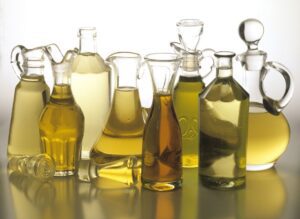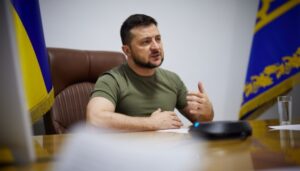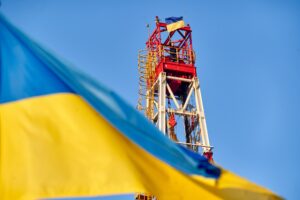
India, the world’s largest importer of edible vegetable oils, expects to receive the first batches of sunflower oil from Ukraine from September after a five-month break caused by the Russian invasion and the blockade of Ukrainian seaports.
According to Bloomberg’s website, citing Indian agricultural trader Sandip Bajoria, India may receive 50-60 thousand tons of sunflower oil in September, as Ukraine is going to open some corridors of the Black Sea for the export of agricultural products from the ports of Odessa and Chernomorsk.
“We have begun to receive offers for August deliveries, but everything will depend on the availability of ships. Ukraine has sufficient reserves of oilseeds for processing,” the trader is quoted as saying.
Sunflower oil imports to India from Ukraine have been suspended since April as the Russian invasion disrupted the country’s trade, he said.
“The Indian government’s decision to allow duty-free imports of 2 million tons of sunflower oil annually this fiscal year and next will support demand. India purchased 1.89 million tons of crude sunflower oil in the year ending October, with Ukraine supplying almost 74%, and Argentina and Russia – about 12%,” the publication clarified in the message.
As reported with reference to the Deputy Minister of Economy – Trade Representative of Ukraine Taras Kachka, in the 2021/2022 marketing year (MY, July-June), the country exported 61.52 million tons of grain and oilseeds worth $22.2 billion.
During this period, foreign markets were supplied, including 4.3 million tons of sunflower oil worth $5.8 billion, 3.4 million tons of sunflower meal worth $960 million, 421 thousand tons of soybean meal worth $230 million, 1.1 million tons of soybeans for $641 million, 2.7 million tons of rapeseed for $1.7 billion and 1.09 million tons of sunflower for $616 million.

On Thursday, July 28, a chain of furniture and household goods stores JYSK opened a store in the Maidan shopping center in Chervonohrad (Lviv region), the retailer’s press service told Interfax-Ukraine.
The press service said that JYSK occupied a space for a store with an area of 982 square meters in the Maidan shopping center and the storage space of 282 square meters.
“We at JYSK believe that by continuing to develop business under martial law, the company contributes to the economy of Ukraine and its future victory. Since the beginning of the war, each opening of a new JYSK store or the resumption of a damaged JYSK store has been accompanied by charity events. This time we would like to draw public attention to the importance of full psychological and metal rehabilitation of our wounded defenders,” JYSK Country Manager in Ukraine Yevhen Ivanitsa said.
The retailer will hold a charity event together with the NGO Space of Opportunities starts a charity event. All customers of the network can take part in it by purchasing patriotic stickers. All proceeds will be transferred to the rehabilitation of the defenders of Ukraine.
According to the press service, the previous charity activity in the sale of patriotic stickers made it possible to collect more than UAH 230,000 in a week.

President of Ukraine Volodymyr Zelensky discussed with Prime Minister of the Netherlands Mark Rutte issues of defense cooperation between the two countries, the export of agricultural products through Ukrainian ports, as well as financial support for Ukraine by the European Union.
“I maintain continued contact with our partners. Discussed the course of hostilities, Ukraine- Netherlands defense cooperation and financial support from the EU with Mark Rutte. Emphasized the importance of exporting Ukrainian grain by sea ASAP,” Zelensky said on Twitter on Thursday evening.
Quotes of interbank currency market of Ukraine (UAH for 1 RUB, IN 01.06.2022-30.06.2022)


The Verkhovna Rada on Thursday adopted an updated law on privatization (No. 7451), which will transfer large privatization to Prozorro auctions without advisers, speed up small privatization and remove a number of problematic issues.
233 deputies voted “for” with the required minimum of 226, according to information on the parliament’s website.
“Regarding large privatization. The main thing that has changed is that we are transferring all large privatization to Prozorro. All procedures have been prescribed as it is in small privatization,” one of the main innovations was named earlier in an interview with Interfax-Ukraine and. about. Head of the State Property Fund Olga Batova.
According to her, large-scale privatization, in the form in which it was and in which it is now, has shown the inefficiency of advisers. Among the claims against them, the head of the Fund singled out the lengthy preparation of the object for privatization; duplication of transactions with potential buyers, in particular on audit; potential corruption risks of engagement by one of the potential buyers.
“The draft law proposes that the Foundation will make a virtual folder (data room) with all the information about the enterprise: all valid contracts, court cases, financial statements – we fully set out and give each potential buyer three months to do an audit on their own,” she described the proposed new procedure, the head of the SPF.
With regard to small-scale privatization, she pointed out that the law further simplifies procedures, for example, introduces an online signature of the auction protocol, shortens the entire process from the moment the auction is announced to the signing of the contract to two months, introduces the possibility in some cases to do without the AMCU, cancels the requirement to publish in newspaper “Vedomosti Privatization”.
“In addition, we have provided for a very important change that will always be in effect: so that payment for the object is made before the signing of the contract – after the auction and the signing of the protocol, but before the signing of the contract,” the head of the SPF stressed. According to her, there are several cases, especially in the auctions held at the end of February, that buyers do not want to pay, arguing that it was force majeure.
Another important norm, she called the possibility of selling objects with arrests, which will allow creditors to finally receive their funds. “We propose to re-register the ownership of the winner of Prozorro, but all arrests will remain until the new owner repays the debt,” she explained.
“The list for privatization today includes a little more than 115 enterprises. There are many more objects,” Batova said.

Ukraine plans to produce 18.5 billion cubic meters in 2022. meters of gas, which is 6.6% (1.3 billion cubic meters) less than in 2021, said Deputy Energy Minister Nikolai Kolesnik.
“Based on the volume of actual production that is today, the forecast volume for this year is approximately 18.5 billion cubic meters. This is without taking into account potential losses,” he said in Kyiv on Thursday.
Kolesnik specified that today the daily gas production in the country is 49.5 million cubic meters. m, while before the start of the war it was about 55 million cubic meters. m. At the same time, companies are not yet able to fully carry out new drilling and workover of wells, but only maintain the maintenance of the existing said fund. This is due to the use of equipment that from the air can look like a military one.
According to him, the gas consumption forecast for 2022 is about 21 billion cubic meters. The Deputy Minister clarified that this forecast is based on the consumption profile of previous years, while in the conditions of war and the resettlement of people it is difficult to say exactly what consumption will be.
As reported, natural gas production in Ukraine in 2021 amounted to 19.8 billion cubic meters. m, incl. private companies – 5 billion cubic meters. m.